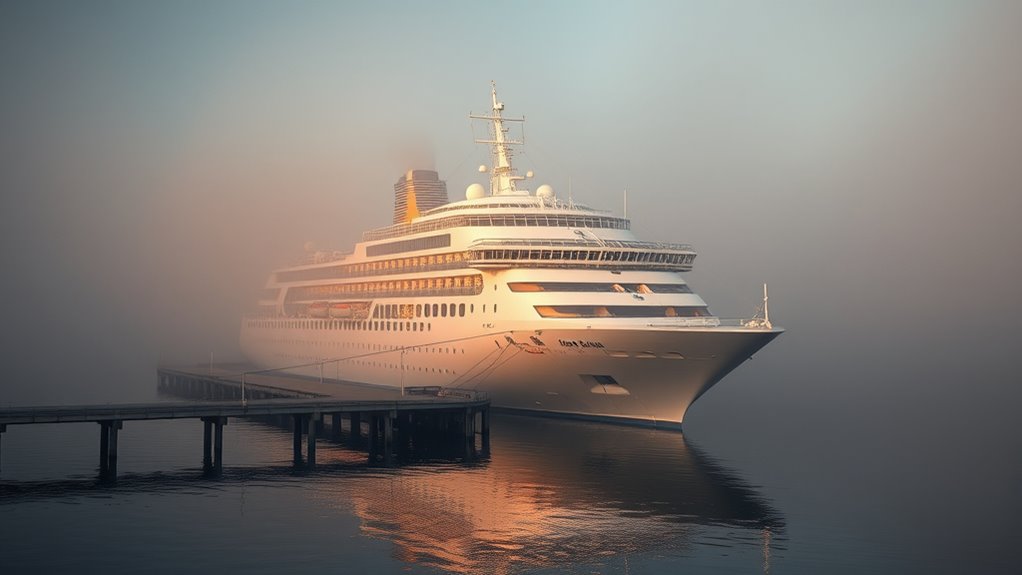If your cruise gets canceled, the cruise line typically offers you a full refund, rebooking options, or future cruise credits. They may also upgrade your cabin or provide compensation if you’re bumped due to overbooking. Safety concerns or weather can lead to cancellations, so staying informed and quick to respond helps protect your investment. To know all your rights and how to maximize alternatives, keep exploring what steps to take next.
Key Takeaways
- Passengers are typically notified promptly with options like refunds, rebooking, or future cruise credits.
- Cruise lines may offer cabin upgrades, compensation, or alternative sailings to accommodate affected passengers.
- Full refunds are generally provided if the cruise is canceled by the cruise line, often processed within 180 days.
- Cancellations due to safety concerns or weather are prioritized, with refunds or alternative arrangements offered.
- Travelers should review policies, keep records, and consider travel insurance for coverage of non-refundable expenses.
Reasons for Cruise Cancellations and Bumping
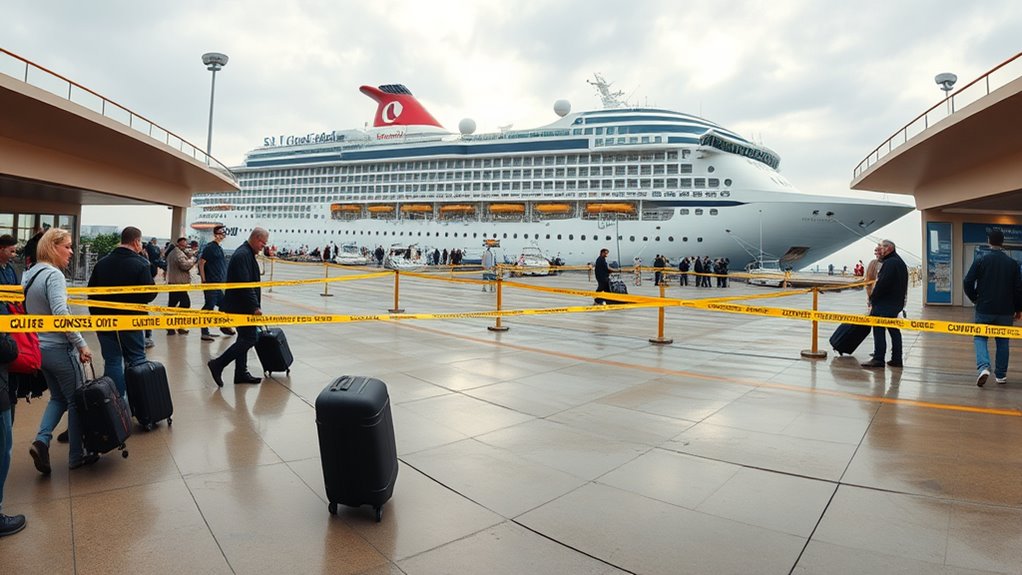
Cruise lines cancel or bump passengers for several practical reasons, often to guarantee safety and operational efficiency. Cruise cancellations happen due to safety concerns like maintenance issues, damage from incidents, or severe weather conditions such as storms that threaten passenger safety. Fleet changes can also lead to cancellations or reassignments when ships are rerouted for new destinations or maintenance. Overbooking, where more tickets are sold than available cabins, sometimes forces cruise lines to bump passengers to manage capacity. Additionally, entire ships or large portions of capacity may be sold through charters, resulting in canceled cruises. If your cruise is canceled or you’re bumped, the cruise line typically offers refunds or alternative arrangements, ensuring you’re not left without options.
How Cruise Lines Handle Canceled Cruises and Passenger Bumps
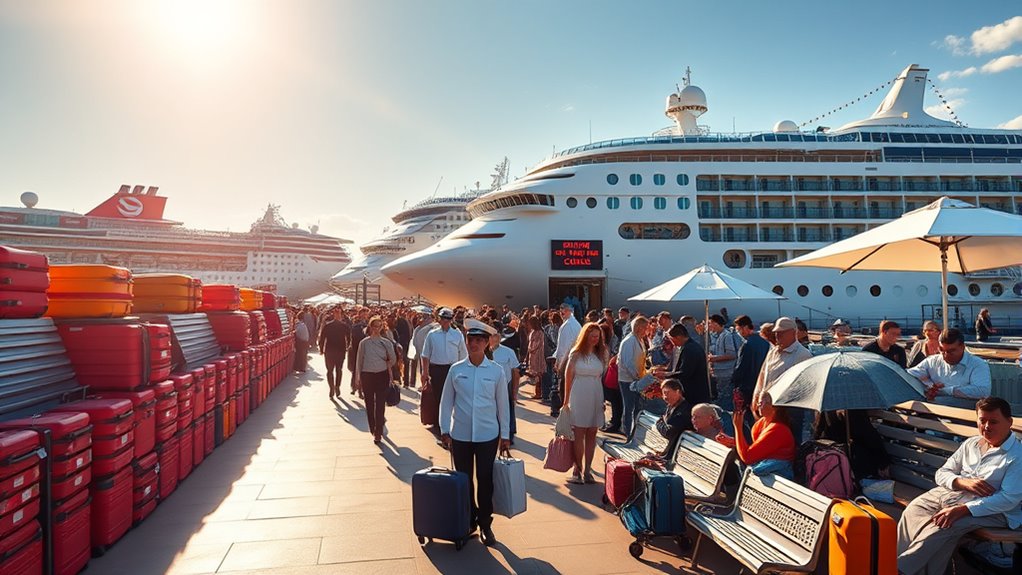
When a cruise gets canceled or passengers are bumped, cruise lines act quickly to minimize your inconvenience. They notify you promptly and offer options like a full refund, future cruise credit, or rebooking on a different sailing. If you’re bumped due to overbooking, cruise lines may upgrade your cabin, reassign you to another ship, or provide compensation. For cancellations caused by safety issues, they prioritize your safety and process refunds or alternative arrangements swiftly. To help visualize, here’s how they handle different situations:
| Situation | Offer/Compensation |
|---|---|
| Canceled cruise | Refund, future cruise credit, rebooking |
| Bumps due to overbooking | Cabin upgrade, rebooking, compensation |
| Safety-related cancellations | Refunds, alternative arrangements |
They aim to keep you informed and comfortable throughout the process, demonstrating their commitment to passenger customer service. Additionally, cruise lines often provide emotional support by communicating clearly and compassionately, helping passengers cope with the inconvenience.
Compensation and Refund Options for Affected Passengers
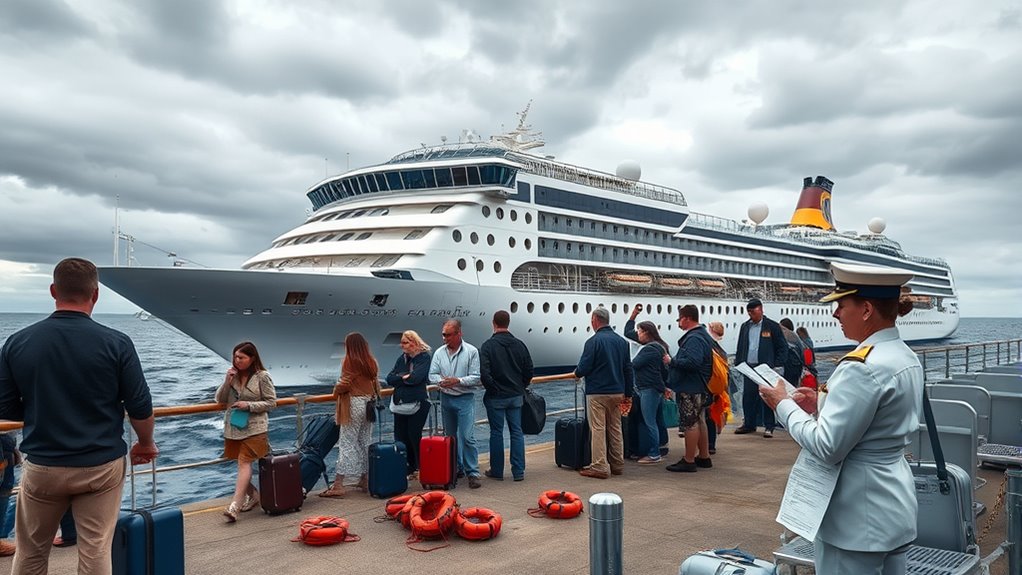
When your cruise gets canceled, you usually have the option of a full refund or a future cruise credit, depending on the cruise line’s policies. Refunds are typically processed within 180 days, and some lines may offer rebooking with discounts or bonuses. It’s also smart to check if your travel insurance covers cancellations to help cover any additional costs. Additionally, understanding cruise cancellation policies can be helpful in navigating your options effectively, especially if your travel plans coincide with holiday celebrations, ensuring a safe and enjoyable experience. Knowing how to get a divorce can also be useful if your personal circumstances change unexpectedly, such as a marriage ending during a planned cruise trip. Moreover, reviewing financial aspects related to your travel expenses can help you make informed decisions about refunds and future bookings.
Refund Policies and Timing
If your cruise is canceled or delayed by more than three days, you’re eligible for a full refund of your cruise fare, accommodations, and related charges. Refund policies specify that you must submit a refund request within 180 days of the original departure date. Timing is vital—ensure your request is made promptly through the cruise line or your travel advisor. Carnival reviews refund claims within this period and may respond with a full refund or offer a future cruise credit as an alternative. Keep in mind that the refund covers charges such as cruise fees, ancillary expenses, and paid services, but excludes optional or non-refundable items. If you decline the refund or credit, you can opt to receive only the charges directly related to the cancellation. Incorporating modern customer service practices, cruise lines aim to handle refund requests efficiently and transparently to maintain passenger trust. Additionally, understanding cruise industry policies can help travelers navigate the process more effectively. Leveraging AI-powered customer support tools can further streamline the refund process by providing real-time assistance and updates. Being aware of retail hours and service options can also assist travelers in managing their post-cancellation arrangements smoothly. Moreover, knowledge of regional legal resources can be beneficial if disputes arise regarding refunds or cancellations.
Alternative Compensation Offers
In cases where a cruise gets canceled, cruise lines often present passengers with alternative compensation options, such as future cruise credits or onboard perks. You might choose to receive a full refund or opt for future cruise credits to rebook later. These credits typically match the original fare paid and can be used toward another sailing. Some cruise lines also offer onboard credits or discounts on future sailings as part of their alternative offers, providing added value. Keep in mind, these compensation options usually have specific claim deadlines—often within 180 days of the cruise cancellation—so it’s important to act promptly. Rebooking with future cruise credits can be a convenient way to plan your next adventure, while refunds ensure immediate reimbursement if you prefer to cancel altogether. Understanding your legal and professional considerations, such as your rights and the processes involved, can help you navigate these options more effectively. Additionally, familiarizing yourself with cruise line policies can ensure you maximize the benefits available to you. Being aware of potential dispute resolution procedures can also assist if disagreements arise regarding compensation. Moreover, some cruise lines may offer additional amenities or upgrades as part of their compensation packages to enhance passenger satisfaction. Being aware of the geographic regulations that may affect your claim can further streamline the process.
Travel Insurance Coverage
Travel insurance can be a valuable resource if your cruise gets canceled, as it may reimburse you for non-refundable expenses like flights, hotels, and tours. In the event of a cruise cancellation due to covered reasons, your policy might provide a refund for these costs. Standard plans typically cover emergency or unexpected cruise cancellations caused by storms or safety issues, but not voluntary cancellations or fleet changes. You may also consider “cancel for any reason” add-ons at extra cost, which offer broader coverage. To receive compensation, you’ll need to file a claim within the specified timeframe, usually 180 days. It’s essential to review your policy carefully, as coverage limits, exclusions, and required documentation vary by provider and plan.
Impact of Cancellations on Travel Plans and How to Prepare
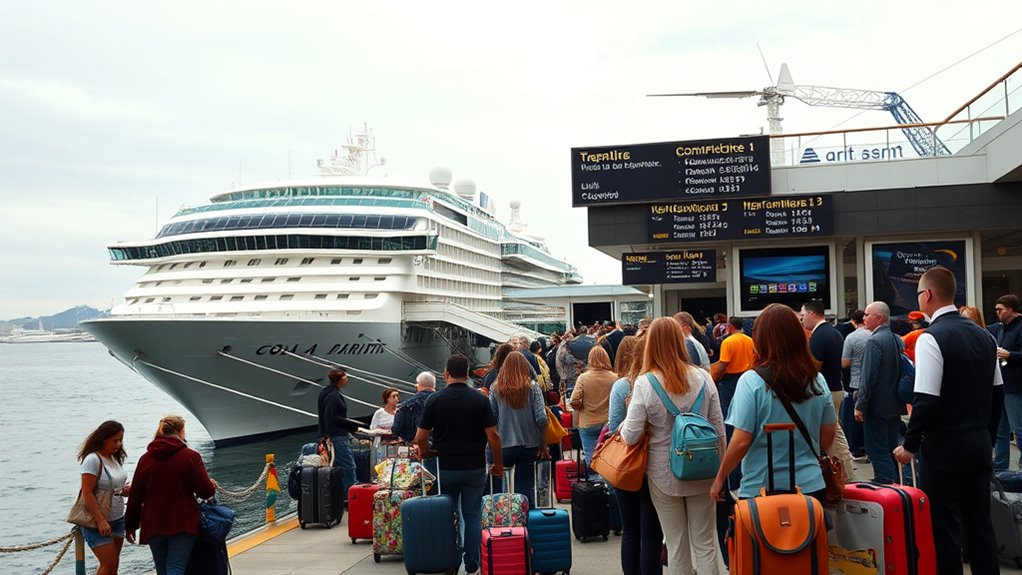
When a cruise gets canceled, your travel plans can be thrown off course, but having backup strategies can make a difference. Knowing the cruise line’s refund policies helps you manage unexpected changes and avoid financial losses. Planning ahead with flexible bookings and travel insurance ensures you’re prepared for last-minute cancellations. Incorporating privacy and consent management practices can also help you stay informed about your options and protect your personal information during the process. Additionally, understanding cost and budgeting aspects related to cancellations, such as potential additional expenses or refunds, can help you better navigate the financial implications and make informed decisions. Being aware of health and safety protocols related to travel disruptions can also help you adapt to changing circumstances and ensure your well-being throughout the process. Furthermore, reviewing the necessary cookies used by travel websites allows you to customize your browsing experience and access important updates related to your trip.
Planning Backup Strategies
Cruise cancellations can considerably disrupt your travel plans, but preparing backup strategies guarantees you’re ready to adapt quickly. Having flexible hotel reservations with free cancellation options helps you make easy adjustments if needed. Research alternative cruise options or similar itineraries in advance so you can quickly switch bookings. A solid contingency plan, including other destinations or travel dates, minimizes disruption. Securing travel insurance that covers non-refundable expenses like flights boosts your financial protection. Stay informed through direct notifications from the cruise line and consult with a travel advisor to understand cancellation policies and potential booking changes. Knowing your refund options and having a clear plan in place helps you respond swiftly, reducing stress and ensuring your trip remains enjoyable despite unexpected cancellations.
Understanding Refund Policies
Understanding refund policies is essential because they determine how quickly and smoothly you can recover expenses if your cruise gets canceled. Your refund policy will specify whether you’re eligible for refunds of your cruise fare, taxes, and fees, or if future cruise credits are offered instead. Typically, if the cruise line cancels, you’re entitled to a full refund, but you need to request it within 180 days of your original booking. Keep detailed records of your payments and correspondence, as refunds usually cover only the cruise fare and associated fees, not non-cruise expenses. Being familiar with the cancellation process and acting promptly can help minimize disruptions. Knowing your cruise line’s specific refund policy ensures you’re prepared to navigate any cancellations smoothly and recover your costs efficiently.
What to Do When You Receive Notice of a Cancellation or Bump

Receiving notice of a cancellation or bump can be stressful, but acting promptly can help you make the best of the situation. First, carefully review the cancellation notice to understand the reason and available options from the cruise line. Reach out to your travel agent or cruise line representative quickly to clarify your choices. Consider these steps:
- Cancel your original booking if it better suits your plans
- Inquire about a full refund or future cruise credit
- Explore alternative cabins, sailings, or dates before accepting changes
- Confirm your eligibility for reimbursement or additional compensation
- Request any necessary documentation to support your claim
Making timely decisions ensures you secure preferred accommodations or alternative plans, especially since availability may be limited once a cancellation is announced.
The Role of Travel Insurance in Protecting Your Investment
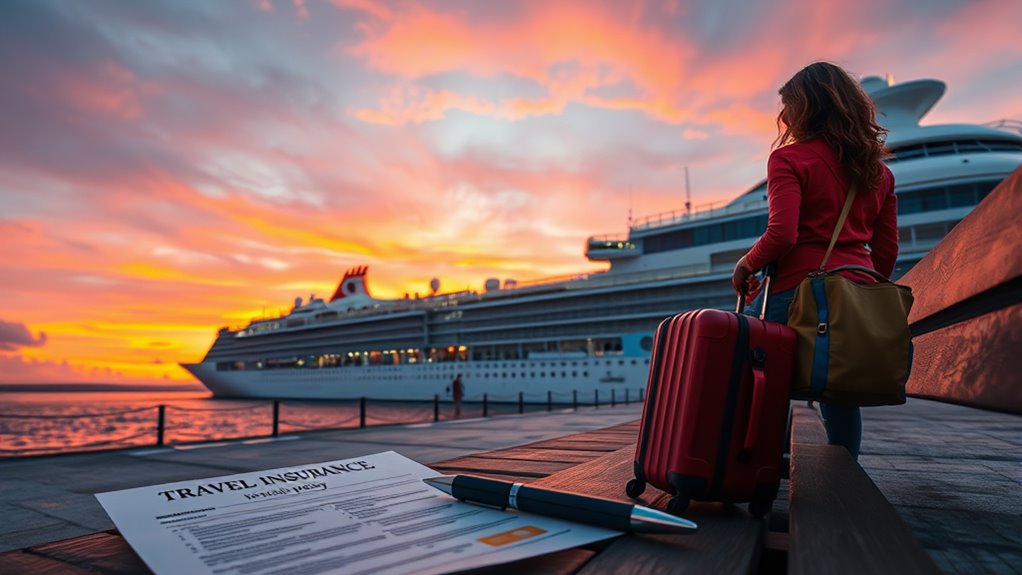
When a cruise is canceled, your next move can make a big difference in protecting your investment. Travel insurance can help by reimbursing non-refundable expenses like flights, hotels, and tours if your cancellation is covered. Many policies require you to purchase insurance before any issues arise to qualify for coverage. Optional “cancel for any reason” add-ons offer broader protection but cost more and often cover only a percentage of unrecoverable costs. Standard policies generally don’t cover voluntary cancellations or schedule changes unless specified. To maximize your coverage:
| Action | Details |
|---|---|
| Purchase early | Ensure coverage applies before issues occur |
| File promptly | Submit claims quickly with documentation |
| Keep records | Maintain receipts and cancellation notices |
| Understand policy | Know what cancellations are covered |
| Use add-ons | Consider “cancel for any reason” for extra protection |
Strategies for Turning a Disruption Into an Alternative Adventure
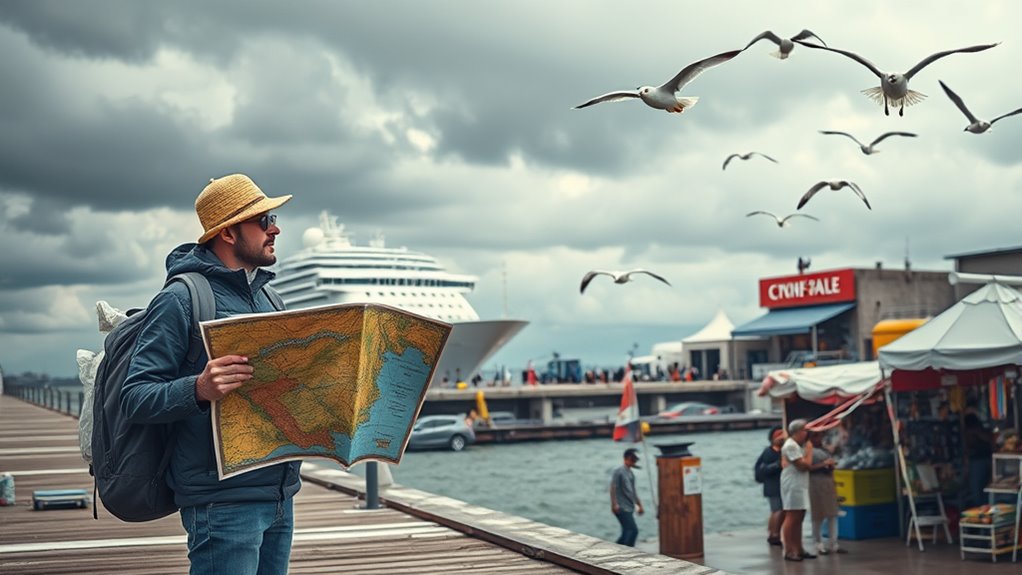
A cruise cancellation doesn’t have to ruin your trip; with quick thinking and strategic planning, you can turn the disruption into an exciting alternative adventure. Start by rebooking on an alternative sailing, possibly with cruise credits or an upgrade to a better cabin. Explore flexible arrangements, such as modifying hotel bookings or land tours, to fit your new plans without penalties. Check if your travel insurance covers trip interruptions—this can help recover costs and ease the shift. Proactively research other destinations or cruise itineraries early, increasing your chances of securing desirable options. By staying flexible and open-minded, you turn a setback into a memorable experience. Remember, seizing the opportunity to explore new destinations can lead to unexpected adventures and lasting memories.
Frequently Asked Questions
What Happens if a Cruise Gets Cancelled?
If your cruise gets canceled, you’ll be notified directly by the cruise line. They usually offer refunds, future cruise credits, or options to rebook. It’s important to contact them promptly to understand your specific options. Keep in mind, travel insurance might help cover some expenses. Stay proactive, and the cruise line will guide you through your choices, ensuring you’re taken care of in this unexpected situation.
Do You Get Your Money Back if You Cancel a Cruise?
When you cancel a cruise, whether you get your money back depends on the cruise line’s policies. Usually, if you cancel early, you might get a full refund or a future cruise credit. However, if you cancel closer to departure, penalties like non-refundable deposits or partial refunds often apply. Make sure to submit your request within the specified window and follow the cruise line’s process to maximize your chances of a refund.
Will a Cruise Ship Leave Without You?
If you’re late, the cruise ship probably won’t wait for you like a patient friend. Usually, ships leave on schedule, and if you miss the departure, you forfeit your booking without a refund. The cruise line’s policies are strict, so it’s essential to arrive on time. They won’t delay the voyage just for you, so plan ahead to guarantee you don’t miss the adventure of a lifetime!
Do Cruises Get Cancelled Often?
Cruises don’t get canceled often, so you usually have a smooth experience. Most lines report less than 1% of sailings canceled each year. Common reasons include scheduled dry docks or technical issues, which are planned in advance. Emergency cancellations due to weather or safety concerns are rare and unpredictable. Larger cruise companies have solid plans, making cancellations even less likely, so you can feel confident about your trip.
Conclusion
Think of a canceled cruise as a sudden storm at sea. It’s unsettling, but with the right course of action, you can navigate through it smoothly. Stay informed, explore your options, and use your travel insurance as your lighthouse. With resilience and a bit of flexibility, you’ll find your way back to calm waters and new adventures, transforming a rough patch into a memorable journey. Your voyage isn’t over—it’s just taking a new route.
Claire, a creative soul with an unquenchable thirst for storytelling, is an integral part of the Voyager Info team. As a dedicated writer, she weaves captivating narratives that transport readers to enchanting cruise destinations and beyond.
Claire’s love affair with writing began at an early age when she discovered the magic of words and their ability to craft worlds and emotions. Her innate curiosity led her to explore various literary genres, but it was travel writing that truly captured her heart. Drawing inspiration from her own globetrotting adventures and encounters with diverse cultures, Claire embarked on a journey to become a travel writer par excellence.

